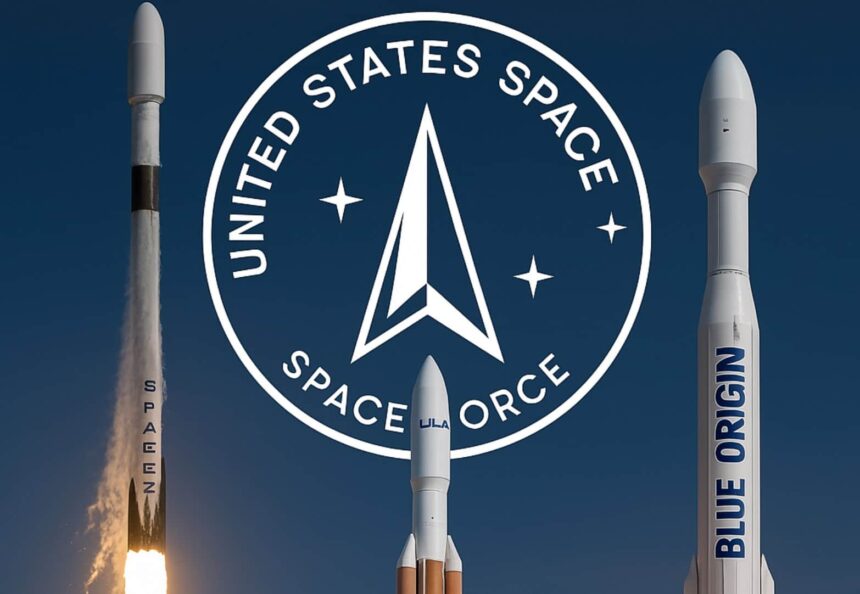Space Force Chooses Three Launch Providers for Vital Missions
The U.S. Space Force has taken a big step to secure the future of space launches for national security. On Friday, it announced new contracts worth up to $13.7 billion. These contracts are part of a major program called the National Security Space Launch (NSSL). They aim to ensure that America can send important military and intelligence satellites into orbit through the year 2032.
This time, the Space Force has picked three companies to handle these top-level missions:
- SpaceX received the largest share: $5.9 billion for 28 launches.
- United Launch Alliance (ULA) was awarded $5.4 billion for 19 launches.
- Blue Origin was granted $2.4 billion for 7 launches.
This is the first time that Blue Origin, a private space company, has been included in such high-level defense launch contracts. Even though Blue Origin’s rocket, New Glenn, has not yet completed full certification by the military, it has still earned a place in the launch lineup.
This category of missions is known as Lane 2, which includes the most important and sensitive payloads. These are the satellites and equipment that help the U.S. military with communication, surveillance, and navigation. The Space Force is planning 54 Lane 2 launches between 2027 and 2032, almost twice as many as before.
Launch Deals Designed to Keep U.S. Safe and Competitive
Top military officials explained why these contracts are more than just business. According to Gen. Chance Saltzman, Chief of Space Operations for the U.S. Space Force, a strong and flexible launch system is critical. It supports both national security and the U.S. economy. In his statement, he said the NSSL program is not just a typical project—it’s a strategic necessity. It makes sure American forces have the tools they need in space to stay safe and win in any conflict.
By picking multiple launch providers, the Space Force wants to avoid depending on just one company or rocket. Using different rockets from different companies means fewer delays if something goes wrong with one provider. It also pushes the companies to compete, which can lead to better service and possibly lower costs.
Blue Origin’s entry, even without military certification yet, shows that the Space Force is willing to invest early in new heavy-lift rockets. New Glenn is expected to make its first orbital flight in January 2025. If successful, it will join SpaceX’s Falcon Heavy and ULA’s Vulcan Centaur as launch vehicles trusted for key missions.
Maj. Gen. Stephen Purdy, a high-ranking Air Force official, emphasized that these new deals help the U.S. keep its leadership in space launch. He said the contracts will not only secure military satellite launches but will also support the launch industry and improve readiness.
Timeline, Goals, and Additional Missions Explained
Although the contracts have been announced, the actual launches won’t begin right away. The mission assignments will start in fiscal year 2025, but the first launches are not expected until 2027. This delay is normal because it takes about two years to prepare each mission. Satellites have to be matched with the right rocket, tested, and integrated carefully.
The launch market for national security missions is now being divided into different parts or “lanes.” Lane 2, where these contracts fall, is meant for high-priority missions with proven rockets and experienced providers. This includes SpaceX, ULA, and now Blue Origin.
There is also another part of the program called Lane 1, which is for lower-risk missions. Lane 1 contracts are still open to newer and smaller companies. Some of these include Rocket Lab and Stoke Space, which may be able to handle less sensitive missions. These Lane 1 missions could bring in $5.6 billion in funding for about 30 launches.
By doing this, the Space Force is giving both established and upcoming launch companies a chance to grow. Lane 2 is kept for big and critical missions, while Lane 1 offers entry-level opportunities for newer players in the space industry.
In 2023, governments around the world spent a total of $58.4 billion on space defense. That number has nearly doubled since 2018. The U.S. Space Force’s investment in these contracts shows how seriously it is taking the need for dependable space launch services in an increasingly crowded and contested space environment.
These new contracts are a central part of the U.S. military’s efforts to maintain safe, fast, and reliable access to space. They are not just about putting satellites into orbit. They are about making sure that the U.S. military has all the tools it needs to operate effectively, from global communication to advanced surveillance.




